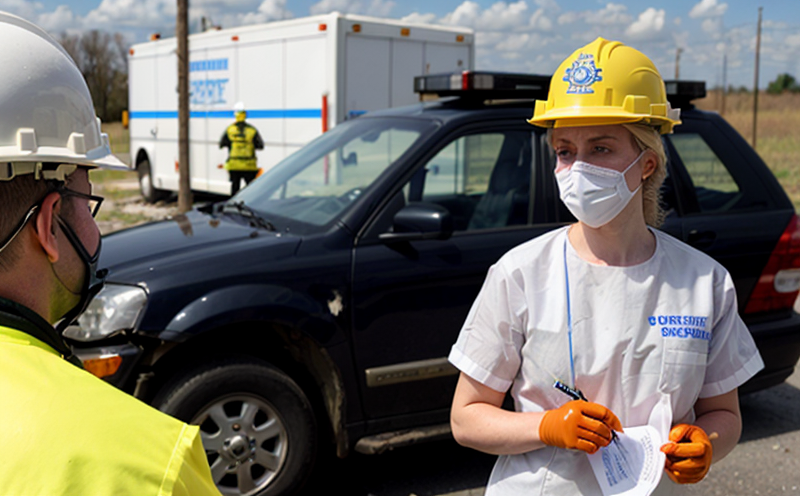ISO 9697 Gross Beta Activity Testing for Accident Scenarios
The ISO 9697 standard provides a method to determine gross beta activity in liquid and solid materials. This testing is particularly crucial during emergency response scenarios involving radioactive accidents, where rapid and accurate quantification of beta-emitting radionuclides can be life-saving. In the event of an accident, the immediate assessment of environmental contamination or occupational exposure risks is essential for effective mitigation measures.
The protocol outlined in ISO 9697 involves several key steps: sample collection, preparation, and analysis using appropriate instrumentation. Samples are typically collected from affected areas or individuals exposed to the radioactive material. Preparation includes dilution if necessary, homogenization, and filtration depending on the nature of the sample (liquid vs. solid).
The testing process itself requires specialized equipment such as liquid scintillation counters for liquids and low-background beta-gamma coincidence spectrometers for solids. The accuracy and precision of these instruments are critical to ensure reliable results that can inform decision-making processes in emergency response situations.
One of the primary challenges in this type of testing is ensuring minimal interference from other radiation types, particularly gamma rays which may overlap with beta signals. Advanced filtering techniques and calibration procedures help mitigate such issues. The ability to differentiate between various radionuclides based on their unique energy spectra further enhances the reliability of test results.
Another important aspect is the interpretation of findings within the context of accident scenarios. This involves understanding how different levels of beta activity might impact human health and safety, as well as environmental integrity. By providing timely and accurate data about gross beta activities, laboratories like ours contribute directly to reducing potential risks associated with radioactive incidents.
Our expertise in conducting ISO 9697 tests enables us to offer comprehensive support for organizations dealing with radiation emergencies. Whether it's assessing contaminated sites or evaluating worker exposures, our services play a vital role in ensuring swift and effective responses.
In addition to technical proficiency, we emphasize clear communication of results through detailed reports that include all relevant data points necessary for stakeholders involved in accident management processes. This transparency fosters trust among clients while also aiding regulatory bodies in making informed decisions regarding containment strategies or clean-up activities.
Why It Matters
The importance of ISO 9697 gross beta activity testing cannot be overstated, especially when considering its application during radioactive accidents. Accurate measurement of beta-emitting radionuclides is crucial for assessing both immediate health risks and long-term environmental impacts.
Immediate Health Risks: Rapid assessment helps identify individuals who require urgent medical attention or protective measures to prevent further harm.
Environmental Integrity: Continuous monitoring ensures that contaminated areas are properly contained, minimizing spread of radioactive materials into broader ecosystems.
Regulatory Compliance: Meeting international standards like ISO 9697 demonstrates commitment to best practices and aligns with global guidelines for handling nuclear incidents.
Public Confidence: Transparent reporting builds trust between affected communities and authorities responsible for managing such crises.
The timely provision of reliable data enhances overall preparedness, enabling quicker recovery efforts post-accident. Moreover, by adhering to stringent quality control measures during testing, we uphold the highest standards of integrity and accuracy.
Customer Impact and Satisfaction
Our clients benefit significantly from our ISO 9697 gross beta activity testing services, which are tailored specifically for emergency response scenarios. By leveraging this expertise, customers can expect:
Swift Turnaround Times: Ensuring rapid turnaround is critical during emergencies; hence we prioritize quick processing of samples.
Comprehensive Reporting: Detailed reports provide all necessary information needed by various stakeholders involved in managing radioactive accidents.
Confidence in Results: With adherence to international standards and rigorous quality controls, our tests yield dependable results that instill confidence among clients.
Economic Efficiency: Efficient testing processes help minimize costs associated with extended containment periods or unnecessary evacuations based on overestimated risks.
Client satisfaction is paramount to us. We strive to deliver exceptional service by combining cutting-edge technology with professional expertise, thereby ensuring that our customers receive the support they need during critical moments.
Environmental and Sustainability Contributions
Reduction in Contamination Spread: By accurately identifying and quantifying beta-emitting radionuclides early on, we help prevent further contamination of air, water bodies, or soil which could otherwise have severe ecological consequences.
Support for Cleaner Technologies: Our work contributes towards developing safer nuclear technologies that minimize the generation of hazardous waste while maximizing resource efficiency.
Promotion of Sustainable Practices: Through our testing services, we promote sustainable practices by supporting organizations in their efforts to comply with environmental regulations and reduce their carbon footprint.
Enhanced Public Health Outcomes: Timely and accurate assessments enable better-informed public health interventions, leading to improved long-term well-being for affected populations.
Our commitment to sustainability extends beyond just our operations; it encompasses the entire value chain of our services. By providing reliable data that supports effective emergency responses, we help create a safer environment and promote responsible use of nuclear technology.





